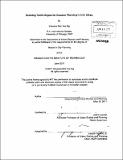Evolving technologies for disaster planning in U.S. Cities
Author(s)
Ng, Vanessa Mei-Yee
DownloadFull printable version (5.746Mb)
Alternative title
Evolving technologies for disaster management in U.S. Cities
Other Contributors
Massachusetts Institute of Technology. Dept. of Urban Studies and Planning.
Advisor
JoAnn Carmin.
Terms of use
Metadata
Show full item recordAbstract
The rapid development of modem technology has increased access to and reliance on sophisticated communication and real time technology. These technologies, which have become embedded within everyday life, have significant implications for government agencies - particularly within the field of disaster management. This paper draws on the evolution of disaster research, the history of disaster management in the US, literature on emerging uses of social media technology, and interviews from 24 emergency management offices in the US to examine three questions: 1) What types of technology are cities currently using in disaster management, 2) Which factors are most influential in determining how cities select emergency management technology, and 3) How can future technology development better address the needs of emergency managers? Several conclusions and observations emerged from analysis of the current literature and interview data. First, technology is primarily used by city disaster management agencies in the preparedness and response phrases of the disaster cycle. These technologies can be grouped into communications, data management, and simulation technologies. Cities are already operating on web-based platforms and are, in many cases, tentatively experimenting with the use of social media as a one-way broadcasting system rather than a bi-directional platform to gather information from the general public. Second, while various factors impact technology adoption, funding, the support of a political champion, and legal concerns stand out in particular. In addition to these adoption factors, cities are also currently facing a number of challenges including general interoperability, changing government-public relations, and increasingly mobile populations. Future technology needs must work to address these issues through the development and adoption of open standards, strengthening data integration capacities. Cities much also better leverage both existing and new forms of communication to build the level of trust needed to both reduce vulnerability and increase resilience.
Description
Thesis (M.C.P.)--Massachusetts Institute of Technology, Dept. of Urban Studies and Planning, 2011. Cataloged from PDF version of thesis. Includes bibliographical references (p. 63-65).
Date issued
2011Department
Massachusetts Institute of Technology. Department of Urban Studies and PlanningPublisher
Massachusetts Institute of Technology
Keywords
Urban Studies and Planning.